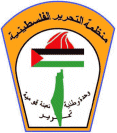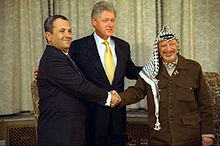Palestine Liberation Organization
![]()
PLO is a redirect to this article. For other meanings, see PLO (disambiguation).
The Palestine Liberation Organization (Arabic منظمة التحرير الفلسطينية Munaẓẓamat at-Taḥrīr al-Filasṭīniya), or PLO (from Engl. Palestine Liberation Organization), is an umbrella organization of various factions that seeks representation for all Palestinians, including those in Arab and non-Muslim exile. By far the strongest faction is Fatah.
The PLO was founded on 28 May 1964 at the constituent meeting of the Palestinian National Council (PNC) at the initiative of the then Egyptian President Gamal Abdel Nasser in Jerusalem to create a representation of the Arab people in Palestine within the framework of a pan-Arab movement. From 1969 until his death on November 11, 2004, Yasser Arafat was PLO chairman. Arafat was instrumental in the formation of a Palestinian national consciousness and the desire for an independent state of Palestine. The 1967 Six-Day War triggered a wave of Palestinian refugees: their representation brought the PLO to its current prominence. Under Arafat's leadership, the PLO radicalized, terrorist attacks were carried out. After the Battle of Karame, the Palestinian refugee camps in Jordan became the PLO's power base. The Jordanian army drove out the PLO militias in Black September 1970, and the PLO then confined itself in the refugee camps, with the help of foreign funding, to social objectives such as building hospitals and schools, while building an army of some 20,000 men in southern Lebanon. After the Israeli army invaded Lebanon in 1982, the PLO had to move its headquarters to Tunis. In the ensuing internal power struggles within the PLO, Arafat was able to assert himself. In the course of the First Intifada and the Second Intifada, a power struggle developed between the PLO and Hamas, in which the PLO lost its leading role as the representative of the Palestinian population.
The PLO's greatest foreign policy success was its recognition as the "representative of the Palestinian people" by the United Nations in 1974. Since Arafat's death, the new chairman has been the President of the Palestinian Authority, Mahmoud Abbas.

Logo of the PLO .
History
Founding history
Ahmad Shukeiri, Palestine's representative to the Arab League, was charged with the establishment of an executive organization of the Palestinian side at the Arab League Summit Conference in Cairo in 1964. On May 28, 1964, the first Palestinian National Council P.N.C. met in Jerusalem and decided to establish an "Organization for the Liberation of Palestine" on June 1, 1964. Shuqairi assumed the leadership of the organization. Under Schuqairi (or Y. Hammudas after 1967) the PLO was de facto a tool of Egyptian policy.
Motives for the foundation
- The initiative came from the Egyptian president at the time, Gamal Abdel Nasser, who saw political and military potential in the young Palestinians living in refugee camps, which he intended to use for himself. He entrusted his friend Ahmed Shuqairi with the PLO presidency.
- Nasser claimed leadership of the Arab world for himself. After the Israelis' Jordan project, he felt compelled to take action and defend this claim.
- The PLO was to be an official representation of the Arab people of Palestine and under the control of the Arab League.
- The leadership of the various Palestinian groups, which until then had operated as secret resistance movements, was to be centralized.
Further development and detachment from pan-Arabism
Fatah remained aloof from the PLO for the time being. The Six-Day War of 1967 led to an intensification of the Palestinian problem in the Middle East. As a result of the new Israeli conquests, hundreds of thousands of Palestinians came under foreign rule or fled. As a result of the devastating defeats of the Arab armies, the Palestinian refugees were not fulfilled their twenty-year hope that "they would only have to wait in their camps for help from the neighbouring Arab countries". Instead of the repeatedly promised solution to the Palestine problem, the constant state of war brought new misery and occupation instead of freedom and self-determination. The Palestinians no longer wanted to be a calculus in the interest politics of Nasser and other aspiring Arab rulers. After Nasser's defeat in the 1967 Six-Day War, Shuqairi also lost influence and had to hand over the PLO leadership to the lawyer Hammudi.
In 1968, after a terrorist attack on a bus filled with Israeli children, the Battle of Karame took place, ushering in the takeover of the PLO by the Palestinian resistance led by Yasser Arafat. That same year, the PLO's mandates were redistributed. The resistance movements now formed the majority. Fatah was the strongest faction in the PLO. The armed struggle against Israel was included in the National Charter, the PLO's basic program. Hammudi was defeated on 3 February 1969 by Yasser Arafat, founder and leader of the militant-revolutionary al-Fatah and symbolic figure for the Palestinians' liberation aspirations and for the new self-image as a Palestinian people. From then on, the PLO pursued a decidedly Palestinian nationalism and the goal of establishing a secular state of Palestine within the borders of the old British Mandate territory of 1920 (this includes the territories of present-day Israel, the Gaza Strip, the West Bank, part of the Golan Heights, and the Kingdom of Jordan).
With Fatah's takeover of the PLO, the focus of its work shifted from the political to the military. Numerous radical sub-groups became part of the PLO and have since had a strong influence on its activities. From 1970 onwards, the PLO fought an armed underground struggle, mainly from Beirut in Lebanon. Prior to that, it and other rebel groups had been expelled from Jordan after Black September. The expulsion from Jordan was triggered by an assassination attempt by the Palestinian DFLP on Jordan's King Hussein I, which resulted in a full-scale civil war. In the fierce battles between the PLO and the Jordanian military, some 3,000-5,000 Palestinians were killed, including many civilians. In its new base of operations, Lebanon, the PLO was soon again the cause of a civil war when it began to engage in skirmishes with local militias. First it fought the Maronite Phalange militia, and later the Shiite Amal militia. For this reason, the PLO was extremely hated by many Lebanese - Muslims and Christians alike; the Israeli invasion in 1978 even found brief support among large segments of the Lebanese population.
In the 1970s, the PLO was an umbrella organization of eight organizations with headquarters in Damascus as well as Beirut. However, the PLO's relations with Syria deteriorated in the early 1980s. In 1999, Syrian Defense Minister Mustafa Tlas called Arafat a "son of 60,000 prostitutes." Yasser Arafat first visited Damascus again in 2000, after a 17-year absence, at the funeral of President Hafiz al-Assad. Since Arafat's death, however, there seems to have been a rapprochement by Mahmoud Abbas with Syria. Through numerous attacks against civilians (hostage-takings, such as the Munich hostage-taking during the 1972 Olympic Games, or airplane hijackings), the PLO gained worldwide attention. At the meeting of the Arab League in 1974, the PLO was recognized as the only legitimate representation of the Palestinian people, and shortly thereafter it was also recognized by the United Nations, receiving observer status in the UN General Assembly. Its sometimes very bloody actions in Israel contributed to the Israeli invasion of Lebanon (see Ma'alot Massacre and Coastal Road Attack).
Loss of exclusive representation and development from 1987 onwards
With the First Intifada, beginning in 1987, the PLO's claim to sole representation and its leadership role among the Palestinians suffered. Organizations with more radical positions, such as Hamas and Islamic Jihad, gained more and more importance. Iraq's support of the Arafat-led PLO during the Second Gulf War resulted in the expulsion of Palestinians from Kuwait in 1991 and the collapse of Arab support for the PLO. Within days, some 450,000 Palestinians were forced to leave Kuwait. The catastrophe, which was comparable to the Nakba but received much less media attention, had consequences insofar as the Palestinians began secret mediations with Israel, which led to the Oslo Accords. Only after Arafat's death were leading Palestinian representatives prepared to apologise for supporting Hussein.
As of 1993, the PLO still played a significant role as a Palestinian partner in the Oslo and Cairo peace negotiations with the USA and Israel, and advanced Palestinian autonomy on the basis of the Gaza-Jericho Agreement. For the mutual recognition between the PLO and Israel, Yasser Arafat received the Nobel Peace Prize together with Yitzchak Rabin and Shimon Peres. In the first elections in the autonomous territories on January 20, 1996, Fatah received a large share of the vote and PLO leader Arafat was elected president of the autonomous authority. The establishment of Palestinian autonomy and Arafat's diplomatic successes initially brought back lost sympathy to the PLO.
With the failure of further peace negotiations at Camp David in 2000, however, a peace settlement was once again a distant prospect, and a lack of willingness to compromise on both sides has since led to growing conflicts. At the end of 2000, the second Intifada broke out, in which the PLO took part. A spiral of terror and retaliation reversed much progress. With Yasser Arafat under house arrest by the Israelis in 2001, his and the PLO's position of power declined further; more extremist organizations continued to gain ground ever since. The PLO maintained its own prisons in Lebanon, incarcerating Palestinians who did not want to support the PLO's struggle either personally or financially.
In the course of the rapprochement between Fatah and Hamas in 2011, it was announced that Hamas and Islamic Jihad would also be represented in the PLO in the future. On December 22, 2011, a provisional leadership committee was constituted in Cairo to prepare the accession of the two organizations.

Arafat (r.) with Ehud Barak (l.) and Bill Clinton in Oslo in November 1999
The National Charter
The text of the Palestinian National Charter, as amended in 1968, contains many sections calling for the destruction of Israel. In an exchange of letters between Yasser Arafat and Yitzhak Rabin, which took place in connection with the interim agreement on the West Bank and Gaza, Arafat agreed to remove these sections. On April 26, 1996, the Palestinian National Council voted to delete or correct all of these sections and determined that a new text should be drafted. A letter from Arafat to then U.S. President Bill Clinton in 1998 listed all the affected sections, and a meeting of the Palestinian National Council approved this listing. A public meeting of members of the PLO, the National Council (PNC) and the PLO Central Council (PCC), with Clinton present, also endorsed the letter.
Despite this, a new text for the National Charter was never drafted, leading to ongoing controversy. Critics of the Palestinian organizations claim that the fact that no changes were made proves the insincerity of the Palestinian side. One of the responses to this has been that the constitution of the future state of Palestine would replace the charter. The draft constitution published in 2003 contains the following section regarding the territory of the state: "it is an indivisible entity, based on the borders of 4 June 1967".
No change has been made to the Charter. Article 22, for example, still calls for the destruction of Israel. The Charter can be viewed in a German translation, for example, on the official website of the Palestinian representation in Berlin.
Search within the encyclopedia